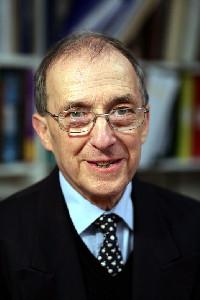|
|
Biography |
|
|
 Sir Peter Julius Lachmann MBBChir PhD ScD (Cantab) FRCP FRCPath FRS FMedSci
Emeritus Sheila Joan Smith Professor of Immunology, University of Cambridge.
Peter Lachmann trained in biochemistry and medicine at Cambridge and University College Hospital graduating MBBChir in 1956. He was a postgraduate student in immunology with Robin Coombs in Cambridge and with Henry Kunkel at Rockefeller University and obtained his PhD in 1962 for a thesis on the pathogenesis of Systemic Lupus Erythematosus.
He was an assistant director of research in the Department of Pathology in Cambridge (1964-1971) and foundation professor of immunology at the Royal Postgraduate Medical School (1971-1975) Since 1976 he has worked in Cambridge as Director of the MRC Molecular Immunopathology Unit and professor of Immunology. He retired in 1999 but ran a laboratory till 2005 and will reopen a small lab in 2011. He is a fellow of Christ’s College and an honorary fellow of Trinity College.
His principal research interests have been in the immunochemistry, biology and genetics of the complement system. He is currently trying to bring to clinical application a method of down-regulating the complement feedback loop, over activity of which is the main predisposing factor to age related macular degeneration.
He was the founder President of the UK Academy of Medical Sciences (1998-2002), Biological secretary of the Royal Society (1993 –98) and President of the Royal College of Pathologists (1990-93); and served on UNESCO’s international bioethics committee from 1993-98. In these capacities he has become involved with the ethical and policy aspects of medical science.
He has kept bees for over thirty years and this hobby has played a large part in stimulating the interest in genetic and cultural evolution.
Sir Peter Julius Lachmann MBBChir PhD ScD (Cantab) FRCP FRCPath FRS FMedSci
Emeritus Sheila Joan Smith Professor of Immunology, University of Cambridge.
Peter Lachmann trained in biochemistry and medicine at Cambridge and University College Hospital graduating MBBChir in 1956. He was a postgraduate student in immunology with Robin Coombs in Cambridge and with Henry Kunkel at Rockefeller University and obtained his PhD in 1962 for a thesis on the pathogenesis of Systemic Lupus Erythematosus.
He was an assistant director of research in the Department of Pathology in Cambridge (1964-1971) and foundation professor of immunology at the Royal Postgraduate Medical School (1971-1975) Since 1976 he has worked in Cambridge as Director of the MRC Molecular Immunopathology Unit and professor of Immunology. He retired in 1999 but ran a laboratory till 2005 and will reopen a small lab in 2011. He is a fellow of Christ’s College and an honorary fellow of Trinity College.
His principal research interests have been in the immunochemistry, biology and genetics of the complement system. He is currently trying to bring to clinical application a method of down-regulating the complement feedback loop, over activity of which is the main predisposing factor to age related macular degeneration.
He was the founder President of the UK Academy of Medical Sciences (1998-2002), Biological secretary of the Royal Society (1993 –98) and President of the Royal College of Pathologists (1990-93); and served on UNESCO’s international bioethics committee from 1993-98. In these capacities he has become involved with the ethical and policy aspects of medical science.
He has kept bees for over thirty years and this hobby has played a large part in stimulating the interest in genetic and cultural evolution.
|
|
|
|
|
|
|
Abstract |
|
|
|
|
Reason and Unreason in Science and its effects on Society |
|
|
|
|
|
Science is the discipline which aims to give general explanations for specific phenomena on the basis of falsifiable hypotheses that can be tested by experiment and observation. It is essentially an exercise in reason and rationality. Science has been – and continues to be -hugely successful in revolutionising the way that the human species lives. Because new experimental approaches continue to be developed, science explanation always remains capable of refinement and is essentially non-dogmatic.
This aspect of science is grossly exploited by a movement which rejects both science and reason as tools for explaining natural phenomena. This encapsulates “unreason” in science. It is particularly focussed (in the biological sphere) on scientific medicine, and opposes vaccination, and any genetic modification of food plants, animals and humans. It also corrupts rational assessments of risk, which is also important in its effect on medicine.
The societal effects of this unreason movement are considerable, affecting food supplies, medical care, and energy supplies to the world.
|
|
|
|
|